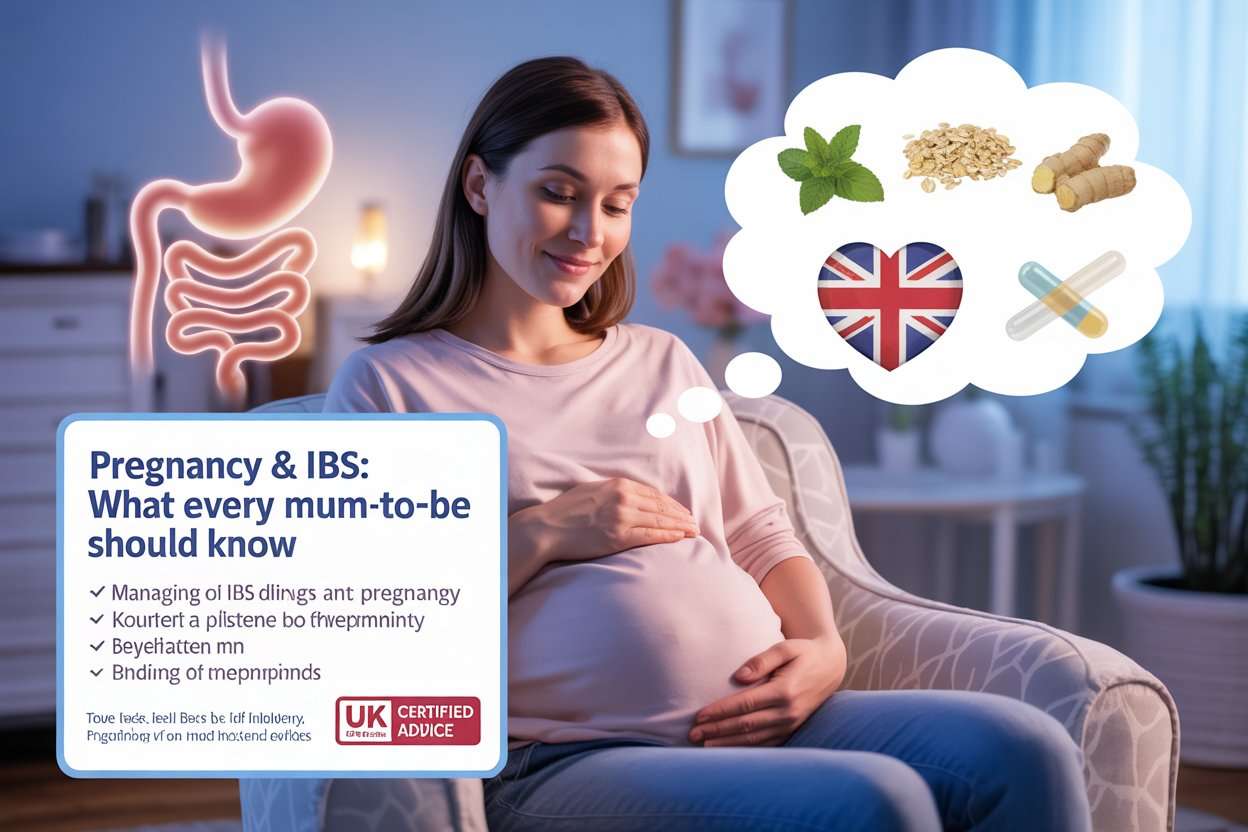What is IBS?
IBS stands for Irritable Bowel Syndrome. It is a common condition that affects the digestive system, particularly the bowels These symptoms can vary in severity and may come and go over time. It often causes stomach pain, bloating, gas, and changes in bowel habits like diarrhea or constipation. Many women experience IBS during pregnancy or may already have it before becoming pregnant. During pregnancy, hormone changes, stress, and pressure on the stomach can sometimes make IBS symptoms worse. It’s important for pregnant women with IBS to understand how pregnancy might affect their condition. This helps them manage symptoms better and stay comfortable. Eating a healthy diet, staying hydrated, managing stress, and getting regular checkups can support both digestive health and a healthy pregnancy.
How Pregnancy Affects IBS Symptoms: Causes and Changes
During pregnancy, a woman’s body goes through many changes, especially in hormone levels. These changes can affect different parts of the body, including the digestive system. Some women notice that their symptoms of Irritable Bowel Syndrome (IBS) improve during pregnancy, while others may find that their symptoms get worse .Some women may notice their symptoms get worse, while others might find them improving.
 Why can symptoms get worse?
Why can symptoms get worse?
- Increased progesterone: This hormone slows down the movement of the intestines, which can cause more constipation.
- Slower digestion: Food stays longer in the intestines, leading to more gas and bloating.
- Diarrhea in some cases: If the intestines move faster, women with IBS-D (diarrhea type) may have more trouble.
- Stomach pain and cramps: The growing uterus presses on the intestines, causing more pain.
- Mental stress and anxiety: Pregnancy can increase stress, which often makes IBS symptoms worse.
Why can symptoms get better?
- Hormonal balance: Sometimes hormones help regulate bowel movement, reducing constipation or diarrhea.
- Healthy eating habits: Pregnant women usually eat healthier, including more fiber and drinking more water, which helps IBS.
- Regular doctor visits: Frequent checkups during pregnancy help manage IBS better.
- Focus on relaxation: Pregnancy often encourages rest, meditation, and light exercise, which can lower IBS symptoms.
As the baby grows, it puts pressure on the intestines. This can slow down digestion and cause discomfort. If you have IBS during pregnancy, you might face issues like increased gas, stomach pain or cramps, constipation, or sometimes diarrhea.
These symptoms can sometimes feel like normal pregnancy discomforts, which makes it hard to tell the difference. That’s why it’s important to monitor any changes and talk to your doctor if you notice anything unusual.
What is the Low FODMAP Diet? (Detailed Explanation)
The Low FODMAP diet is a special type of eating plan designed to help people who have Irritable Bowel Syndrome (IBS). FODMAP stands for a group of sugars that are poorly absorbed in the gut. When these sugars sit in the digestive system, they can cause gas, bloating, stomach cramps, and loose motions. By reducing these foods, many people find that their IBS symptoms improve.
Some foods are high in FODMAPs and are harder to digest. These include:
Garlic and onions – common in many dishes but trigger gas and bloating.
Beans and lentils – healthy but can be hard on the gut for IBS patients.
Fruits like apples, pears, and watermelon – they contain sugars that may not digest well.
Milk, yogurt, and other dairy – especially if you’re lactose intolerant.
Wheat-based products – like bread and pasta made with regular flour.
On the other hand, Low FODMAP foods are easier to digest. These include:
Grains like rice, oats, and gluten-free bread.
Fruits such as bananas, oranges, strawberries, and blueberries.
Vegetables like carrots, cucumbers, potatoes, and spinach.
Milk alternatives like lactose-free milk, almond milk, or coconut milk.
But it’s important to remember that this diet is not for everyone. It should be done in steps, under the guidance of a trained dietitian. This is even more important during pregnancy, as your body needs a balanced diet to support your baby’s health.
Why Is It Important During Pregnancy?
Pregnancy brings big changes to your body. Your hormones shift, digestion slows down, and your nutritional needs increase. For mums-to-be who have IBS, symptoms may get worse. You may feel more bloated, get stomach pain more often, or feel tired and uncomfortable. This is called a flare-up—and it’s your body’s way of saying something isn’t right.
If IBS symptoms flare up during pregnancy, don’t try to fix it by cutting out many foods on your own. That can be risky. Your baby needs important vitamins, minerals, and energy to grow well. A very limited or poorly planned diet may lead to weakness, poor digestion, or low weight gain in pregnancy.
That’s why you should always get help from a qualified dietitian if you have IBS during pregnancy. A dietitian will help you follow the Low FODMAP plan safely, while still making sure you and your baby get all the nutrients you need.
Managing IBS During Pregnancy: Simple and Effective Tips
The methods you used before to manage IBS can still help now:
Eat small amounts frequently. This helps your stomach handle food better.
Drink plenty of water to keep digestion smooth.
Avoid stress as it can make IBS worse.
Stay away from foods that trigger your symptoms, like very oily or spicy dishes.
Increase fiber slowly in your diet. There are two types of fiber:
- Soluble fiber (which dissolves in water)
- Insoluble fiber (which does not dissolve)
Both affect IBS differently. Adding too much fiber suddenly can make symptoms worse. Slowly add fiber from fruits like strawberries, blueberries, and oranges; vegetables such as cucumber, carrots, spinach, and broccoli; and grains like oats, porridge, and whole wheat bread.
Keep your diet balanced. If you are following a Low FODMAP diet, talk to your doctor. They can guide you on how to get the right nutrients during pregnancy to keep your baby healthy.
Include probiotics in your diet. These are good bacteria found in yogurt, fermented drinks, or supplements. Probiotics improve digestion and are generally safe during pregnancy. Always check with your doctor first.
Exercise lightly, like walking or safe pregnancy exercises. Exercise helps your digestion and also relaxes your mind.At 121 Dietitian, we also help women with IBS flare-ups during pregnancy. We create a special diet plan that can give you relief from symptoms.
You can join our Gut Health Programme, where we guide you step-by-step on how to take care of yourself during pregnancy with IBS.
We will provide you with the right advice and support to manage your health in the best way possible.
Managing IBS During Pregnancy: Simple and Effective Tips
The methods you used before to manage IBS can still help now:
Eat small amounts frequently. This helps your stomach handle food better.
Drink plenty of water to keep digestion smooth.
Avoid stress as it can make IBS worse.
Stay away from foods that trigger your symptoms, like very oily or spicy dishes.
Increase fiber slowly in your diet. There are two types of fiber:
- Soluble fiber (which dissolves in water)
- Insoluble fiber (which does not dissolve)
Both affect IBS differently. Adding too much fiber suddenly can make symptoms worse. Slowly add fiber from fruits like strawberries, blueberries, and oranges; vegetables such as cucumber, carrots, spinach, and broccoli; and grains like oats, porridge, and whole wheat bread.
Keep your diet balanced. If you are following a Low FODMAP diet, talk to your doctor. They can guide you on how to get the right nutrients during pregnancy to keep your baby healthy.
Include probiotics in your diet. These are good bacteria found in yogurt, fermented drinks, or supplements. Probiotics improve digestion and are generally safe during pregnancy. Always check with your doctor first.
Exercise lightly, like walking or safe pregnancy exercises. Exercise helps your digestion and also relaxes your mind.At 121 Dietitian, we also help women with IBS flare-ups during pregnancy. We create a special diet plan that can give you relief from symptoms.
You can join our Gut Health Programme, where we guide you step-by-step on how to take care of yourself during pregnancy with IBS.
We will provide you with the right advice and support to manage your health in the best way possible.
Managing IBS During Pregnancy: Simple and Effective Tips
The methods you used before to manage IBS can still help now:
Eat small amounts frequently. This helps your stomach handle food better.
Drink plenty of water to keep digestion smooth.
Avoid stress as it can make IBS worse.
Stay away from foods that trigger your symptoms, like very oily or spicy dishes.
Increase fiber slowly in your diet. There are two types of fiber:
- Soluble fiber (which dissolves in water)
- Insoluble fiber (which does not dissolve)
Both affect IBS differently. Adding too much fiber suddenly can make symptoms worse. Slowly add fiber from fruits like strawberries, blueberries, and oranges; vegetables such as cucumber, carrots, spinach, and broccoli; and grains like oats, porridge, and whole wheat bread.
Keep your diet balanced. If you are following a Low FODMAP diet, talk to your doctor. They can guide you on how to get the right nutrients during pregnancy to keep your baby healthy.
Include probiotics in your diet. These are good bacteria found in yogurt, fermented drinks, or supplements. Probiotics improve digestion and are generally safe during pregnancy. Always check with your doctor first.
Exercise lightly, like walking or safe pregnancy exercises. Exercise helps your digestion and also relaxes your mind.At 121 Dietitian, we also help women with IBS flare-ups during pregnancy. We create a special diet plan that can give you relief from symptoms.
You can join our Gut Health Programme, where we guide you step-by-step on how to take care of yourself during pregnancy with IBS.
We will provide you with the right advice and support to manage your health in the best way possible.
What should I avoid with IBS in the UK?
Avoid foods that trigger your symptoms, like fatty foods, caffeine, alcohol, spicy foods, and some dairy products. Also, reduce stress and avoid eating large meals.
Should I go to school if I have IBS?
Yes, you can go to school. Managing symptoms with a good diet, regular bathroom breaks, and stress control helps you stay comfortable.
Is IBS considered a disability in the UK?
IBS is usually not classed as a disability unless symptoms are very severe and affect daily life. Some people may get extra support if their IBS is disabling.
What is the biggest trigger for IBS?
Common triggers include certain foods (like wheat, dairy, and caffeine), stress, and hormonal changes.
Can exercise help IBS?
Yes, regular light exercise like walking can improve digestion and reduce stress, which helps IBS symptoms.
When should I see a doctor about IBS?
See a doctor if symptoms are severe, sudden, or include bleeding, weight loss, or persistent pain.
Can stress cause IBS symptoms to flare up?
Yes, stress and anxiety often make IBS symptoms worse, so managing stress is important.
Is IBS permanent, or can it go away?
IBS is a long-term condition, but symptoms can come and go. Many people learn to manage it well with lifestyle changes.
IBS (Irritable Bowel Syndrome) affects many women during pregnancy. In the UK, 121 Dietitian provides expert dietary advice and support to help you manage your symptoms effectively and enjoy a healthy pregnancy.
Links included in this description might be Amazon affiliate links. If you purchase a product or service with the links that I provide I may receive a small commission.




